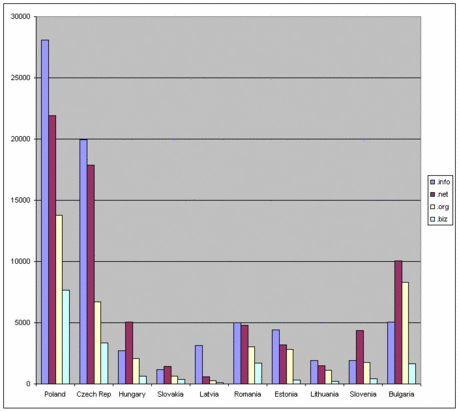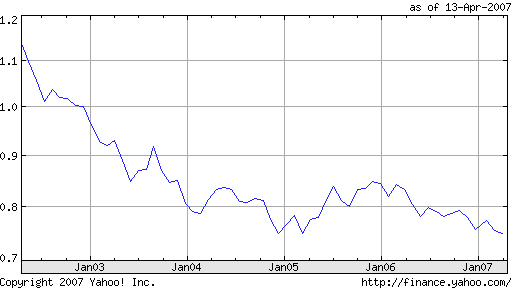Archive
Valuations for the .Info TLD Extension
The past week sales for .Info domains resulted in these purchases:
Money.info $22,000
Bakery.info $9,000
Facts.info $2,550
Floors.info $2,470
Fences.info $2,470
Purchase.info $1,050
The interesting story is the purchase of Bakery.info for $9,000. As reported by DNJournal, the name was originally purchased for $1,850 at SnapNames in 2004 and then resold at a slight loss for $1,760 at Afternic early this year. The domain was finally sold last week to a bakery business in England for a $9,000 price tag. This shows a large discrepancy in value appreciation for the .INFO extension.
In the United States, .Info has had a weak acceptance. This holds true for all extensions other than .com, even their own .us country code extension. The reality for Europe is completely different. We can see how strong .co.uk is in England, and .Info is also surprisingly strong overseas. A graph by Grange Project Management (gpmgroup.com) shows a strong adoption of .Info in eastern Europe. Countries like Poland and the Czech Republic have registered more .Info domains than .net and .org. The price of .Info domains is also very well valued. An example is how Czech concrete company BEST, bought Best.info for $20,880 back in 2005.

(Grange Project Management)
Given the large amount of undeveloped .com domains, I see an opportunity in .Info being used to develop useful and informative websites under prime domain keywords. An example of this is the travel industry and how countries are developing their official travel sites under the .Info extension. See Spain and Austria. Private companies are also investing in this trend. Camping.Info sold in 2006 for $28,100 and has since been developed into a large Camping information website for Europe available in 35 languages. It will be interesting to see the future development of equally attractive .Info domains.
HOTorNOT is now Free
In a sign that seems to support the rebirth of Internet ad spending, popular site HOTorNOT has become completely free. They circled an email to their members today to announce that online advertising would be sufficient to support the costs of running the website, so it was no longer necessary to charge their members. The site became an overnight sensation in 2004 and has since seen a slippery decline in their traffic. However, they still manage to have retained enough traffic.
I expect for this trend of 100% ad supported sites continue to fuel the second wave of the Internet boom. As more and more companies rely solely on revenues from online advertising, it is difficult to see this as a long term sustainable revenue source. Nonetheless, this announcement will probably reignite HOTorNOT’s traffic numbers and take a bite off of websites in the dating field charging for memberships, such as Match and Yahoo! Personals.
In the meantime, all you single souls have a chance to hookup in the comfort of your homes for free.
The Future of Software
A friend sent me this video, and it truly captures the history and future of what software will become. This future is almost here.
Will we find a bottom?

Can you guess what this chart above represents? To almost any investor, perhaps this says to stay away. This, however, isn’t a stock. This chart represents the downfall of the Dollar against the Euro. At the moment of this post, the value had sunken to a mere .7386 on the dollar.
I found the need to write about this, because after commenting it to a few close people, no one had an idea of how low we’d gone. The more concerning issue is a recent announcement of China divesting from the United States, which seemed to go unperceived by the general population. Such an action could continue to pressure the dollar for years to come. Contradictory claims that their diversification of currencies won’t affect the dollar have been proven wrong by the evident decline of the dollar. Below, you can read a few articles shedding light in the situation.
China’s Diversification Won’t Hurt Dollar, Wen Says (Update5) (Bloomberg)
Dollar share of global reserves falls in Q4 -IMF (Reuters)
Dollar falls on Chinese diversification fears (Financial Times)
At the same time that the dollar is plunging, China’s economy is thriving. Investing in China is looking more attractive every day.
How can the United States regain its investment appeal? Is this a sign of a major socioeconomic downfall for the US?
Google Adsense PAYS

(Google Adsense Check Photo)
I get asked many times how this Google Adsense thing works. Well, you put the code in your website at the most optimal style that produces clicks and voila – you get checks in the mail. The code targets ads to your content. By the way, my check is a little bit smaller than the illustrated example 😉
.INFO Quality – then Quantity
The .info extension is still regarded by many as a SPAM extension. However, .info is also used by many for what it suggests – an information website. The question is, why has .info received the association of being a SPAM extension. The answer lies in the strategy from Afilias to reach high number of registrations by lowering registration costs to pennies. This strategy has been one of the worst moves for the extension and for the web in general. A regular .com registration is about $9 per year. Other extensions follow right along, except for .info offered many times for less than $1. For anyone building a website, $9 per year is an insignificant and highly affordable price. Now, for a spammer who has to run a complicated network of dozens, maybe even thousands of websites with individual domains that regularly get banned by other networks and search engines, $9 per domain gets very very expensive. Here is where .INFO comes to the rescue of spammers. At less than $1, spamming the internet through vast amounts of domains becomes much more cost-effective, mathematically speaking – 9 times more cost-effective.
The solution for the rebirth of .INFO is to raise prices, perhaps even higher than the $9 for a .com. Why would .INFO charge more than a .com? Easy, because there are far more great .INFO domains available for registration than there are .coms. I am not suggesting a ridiculous $100 registration, but $12 or $15 is very reasonable for a one year registration. At this point, a huge curve downwards for .INFO registrations will begin and it will be like the death of all those spamming parasites that have leeched to the .INFO extension. Little by little new life will begin to emerge. Solid information websites will begin to adopt the .INFO extension and the rest will follow. More countries will adopt what Spain and Austria have done with the .INFO extension which is the abbreviation for “Information” in more than 25 languages.
OpenID Key to Decentralized Web Development
Web 2.0 has sprung a wide variety of Web Services that can be integrated white label to any website. These sites allow anyone with minimal knowledge of web programming to insert full and complex applications into their sites. I love the freedom this gives and the diversity of tools that can be offered to an existing community in a website. A webmaster now has the ability to choose from a menu of web services. However, one thing is missing – cross integration of the user base. No one wants to sign in, much less sign up ten times on a website – not even twice. When a user signs in to your site, that user should be able to navigate throughout the site always recognized of who he is, able to interact with the site in all those tools. User interactivity is key to building content and fomenting user loyalty.
OpenID comes as a very important component of this integration. Through the use of this technology in all tools, one can authenticate a user and allow them to change from multiple applications all configured to run under one domain. Thus, the user can add comments into the community section powered by Ning. Post videos in the video section powered by Magnify.net. And buy that really cool product advertised through a contextual ad from Ebay – all this done without having to sign in twice.
Once this integration is seamless, typical small and medium websites won’t have a need to worry about difficult server configurations and expensive or custom built applications to do the things we all want to do on the web. Instead, a typical community website will be able to pay $10 for a simple shared hosting space to store a few pictures and files, and then run every other section hosted at the specialized application provider through a CNAME, such as blog.domain.com for their blog run by WordPress (I do that). The end result is far more efficiency. When I used to run my own blog, on my own server, I had to upgrade that thing many times because of security bugs. When I ran my Vbulletin forum it got hacked because you have to upgrade it all the time also. The amount of energy and time that the process of maintaining applications drains your efforts from what you should be focusing on. For this, once OpenID is in place for all applications, many webmasters will sleep better.
Search Engines Subtle Advertisements Against Competing SEs
On my way to Boston from New York I saw a very curious banner on the road. There wasn’t any company mentioned, however it sounded like Search Engine warfare to me… It read something like:
The algorithm killed Jeeves
Upon a quick search I found out that Ask was the one who bought the ad. Hmm.. I am not sure about those Ask marketers spending thousands of dollars on a banner that only reinforced my memory of a failed search engine.
I found this pic on the net by Valleywag

Social.com is up for grabs
Response to Peter’s post on Social.com’s sale.
I believe Social.com has enormous value in it. We can speak of new Web 2.0 companies, but there are two flaws in analyzing successful Web 2.0 companies with strange names as an argument to justify the value of domains.
1. Not enough time has gone by to demonstrate a clear benefit from these names against more common names. A person in the middle of the first Internet Bubble might have argued for a general name, such as Pets.com with the same enthusiasm that we defend a Flickr now. And yes, we know Pets.com’s destiny.
Now we are in the middle of Web 2.0 and all its heat, and we might just all sound like Socrates’ blind men in a cave. The future is still uncertain for the Web 2.0 and its funny name companies.
For a more concrete analysis of brands and names, perhaps it’s safer to go for solid brands – IBM, Microsoft, Coca-Cola, whom have proven their prevalence throughout the decades. I can see Coca-Cola being somewhat generic and descriptive. Pepsi on the other hand, is perhaps more “Flickrish”. Who’s more successful and can that be attributes to its choice of brand? IBM is International Business Machines. That’s descriptive, but who cares? They always only use IBM.
Social.com has a value that no new Flickr domain can have – instant recognition and type-in value. When everyone talks about “social” ever wonder how many people type in social.com to see what’s happening there?
It’s unquestionable that social.com will save money in branding efforts. I spend most of my work time online, and I can hardly keep up and much less remember all these weird sounding companies. But I can guarantee not a single reader of this blog will forget Social.com, Business.com, Money.com, Sex.com. These names are solid and that’s something that will prevail through all our fads. Flickr is “in” right now, but those funny looking names might just be passé in a few years.
2. The second flaw is simply that many of these names aren’t getting a unique brand anymore and could be as descriptive as a generic name, but with the confusion that they aren’t- they are misspelled! What I mean by this is, we all know what Flickr is, because of their mainstream recognition. When you have one thousand new names being registered with an “er” sound, you are no longer unique, rather you are a descriptive brand of your generation, in this case the Web 2.0 generation.
(Disclaimer: I have no affiliation with Social.com)
RE: A Modest Proposal To YHOO and MSFT: Spin Out A Search Company
This is a response to John Battelle’s post suggesting a MS/Yahoo collaboration/spin off.
To summarize what was proposed, John believes that both Microsoft and Yahoo should form a search company owned 50/50 and spun out to public. The company would have a minimum of 10 year commitment from MS and Y! and it’d be established in the valley to increase their chance of recruiting.
To this, I say such solution would be detrimental to both companies and this isn’t the battle Microsoft and Yahoo want to go into. First, we need to define what is being conquered. Initially, we might think it’s Search being conquered. However, it isn’t Search, what Google, Yahoo! and Microsoft are after. Rather, all of these companies are after internet users and getting them to spend as much time as they can in their virtual properties. Because this is the most important goal, it isn’t Google who’s number one. Microsoft is in a much better position, and they can increase their dominance in the Internet space by bringing Google closer to Microsoft’s home territory – the OS. Google has been making attempts to invade that space, but they have yet to conquer it. In this battle, Microsoft will have home court advantage.
Users still see Windows when they boot up, and this is Microsoft’s strongest advantage. Microsoft can play that card for more than a decade and still guarantee dominance in the Internet field. I don’t propose setting a new company and sinking more cash into Search. Nor should they be going out and building properties to become the next Yahoo! or the next Condé Nast. That would be a divide and conquer strategy won for Google. Google has their own problems with Search right now, and thousands of competitors looking to bring them down in that area. Search could even become passé as new technologies disrupt the process. Google is being smart by diversifying, but that can also hurt them if they diversify into areas that don’t support the goal of attracting users to their internet properties. Thus, while Microsoft already owns the users when they sit down in front of a computer, Google still doesn’t have a strong position in this core advantage. At the moment they are trying with Google Desktop which is something they should continue to build on, YouTube by attacking the Television front (a front being attacked by MS through Xbox and Media Center), and DodgeBall in order to get inside of the other computer – the cellphone.
Microsoft can use their OS advantage to make a transparent transition to the new Internet – an Internet of Web Services. By subtly modifying their OS to integrate more into the web, by converting more of their applications into web applications, and by adding more interactivity through web technologies in a user’s desktop, Microsoft will be able to encapsulate their users into a Windows Web. For example, the popular MS Word can open up from a user’s desktop, but synchronize its files with an Internet hard drive. Storage is cheap. A MS Office license can get you an Internet hard drive that is synced with your local hard drive, you can mark the documents you want to share and have instant collaboration with your contacts. The user never found out anything about a web browser. Another application could be a social network, like face book, but built into the OS, integrated with MSN Messenger. This can all be done connected through the web, without going to a web browser. And if a user doesn’t go into a web browser, Google starts to hurt (Adobe’s Apollo). If a user finds everything they need, then they don’t have to search for anything (huh? 🙂 or search much less.
If Microsoft devices a way to make the web easier through a Windows Web, the user will stay locked in their own comfortable place (Rafa to MS: sink more money to your OS conversion to Web). Think about AOL’s success in the 90’s. Why did people prefer AOL? AOL was a comfortable place for people that weren’t too tech savvy. As the web continues to evolve, people will not move as fast as the Internet technology. Us techies like to think technology adaptation is instant, but the general population has a slow adaptation rate. You can understand this better by reading Crossing the Chasm by Geoffrey A. Moore. He talks about how most people in the normal curve are hesitant to try new things and dives into the process of adaptation for all major types of people. Microsoft is in the best position to hold on to the majority of the population. A new Search company by Microsoft and Yahoo! would have to start from the very left tip of the curve, and this is something rough, costly and unpredictable. MS already crossed the chasms. MS doesn’t need search dominance, or spin off a Search company; they need to make their OS be the hottest Web OS.
